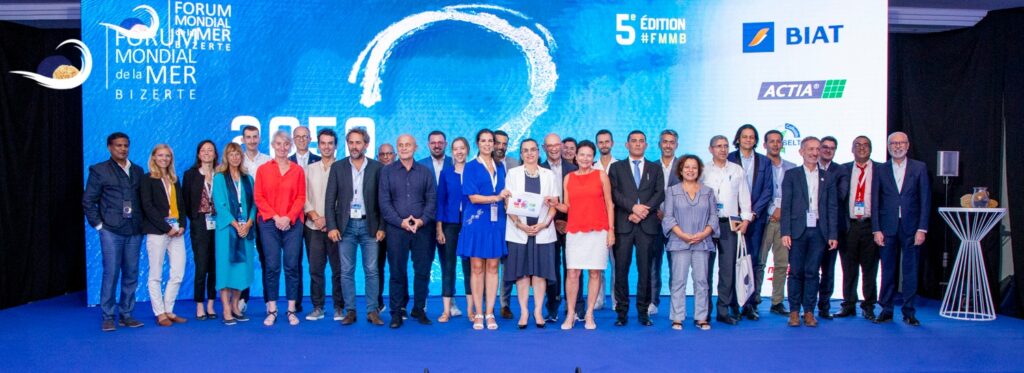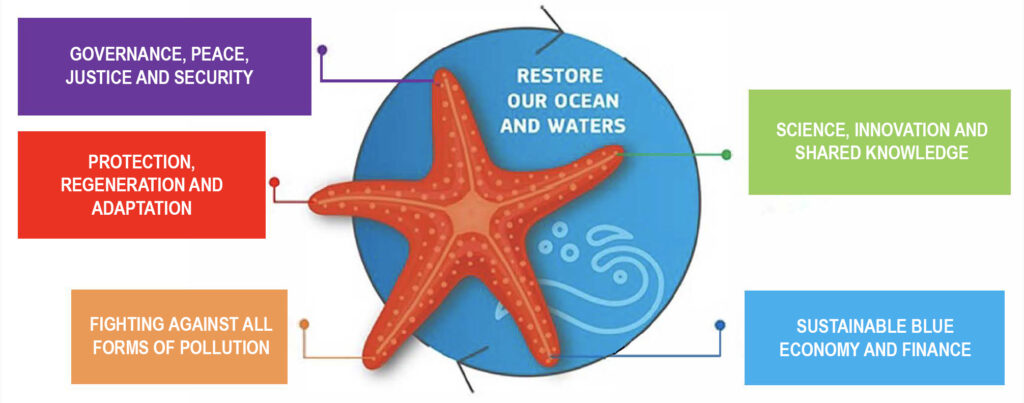Under the aegis of Rym Benzina (President of La Saison Bleue) and Pascal Lamy (President of the Forum), the 5th edition of the Forum Mondial de la Mer (World Sea Forum) in Bizerte, Tunisia has taken an unprecedented turn that calls for an international mobilisation – a “cooperation shock” to work urgently and collectively towards a healthy Ocean by 2050. Olivier Poivre d’Arvor, French Ambassador for the Poles and Maritime Issues, Pierre Bahurel, the Director General of Mercator Ocean International and many international personalities have co-signed the Bizerte Declaration.

“Saving today’s ocean and planning for that of 2050”
In this year 2022, the ocean has been placed at the top of the European and international agenda in an unprecedented way, starting from the One Ocean Summit in Brest, France, in February, the Our Ocean Conference in Palau in April, the United Nations Ocean Conference in Lisbon in June-July, and the UN negotiations on the High Seas in New York through several meetings. Driven by their commitment to the ocean, several experts, scientists, economic representatives, associations and politicians gathered once again at the initiative of the Saison Bleue and the Ocean & Climate Platform at the Forum Mondial de la Mer in Bizerte, at the heart of the Mediterranean Sea, to produce a forward-looking reflection on the ocean in 2050 and to develop an initial Action Plan for confronting the challenges of the future.
The “Forum Mondial de la Mer- Bizerte”, was originally created in 2018 under the chairmanship of Pascal Lamy, President of the European Starfish Mission, and it is the only international meeting on the southern shore of the Mediterranean dedicated to maritime issues. This year’s theme is reminiscent of the UN Decade of Ocean Science for Sustainable Development, but reaching further, imagining a roadmap for the ocean we want in 2050.
The Bizerte Declaration, a call for a “cooperation shock”
The fruitful discussions at the Forum Mondial de la Mer led to the signature of the Bizerte Declaration. By creating the Ocean2050 Team, which will provide a roadmap for the international community to achieve Sustainable Development Goal 14 (“Conserve and sustainably use the oceans, seas and marine resources for sustainable development”), the signatories of the Bizerte Declaration “call on States, international and non-governmental organizations, the scientific community, the environmental monitoring bodies, businesses, investors, users of the sea and civil society organizations to work together in order to build a safe and healthy ocean by 2050”.
The Bizerte Declaration calls for a strong collaboration, a “cooperation shock”. Olivier Poivre d’Arvor – French Ambassador for the Poles and Marine issues, Special envoy of the President of France for the UN ocean Conference 2025 – explains that “we need a shock of cooperation, we need to work together towards the same objective, which is transnational and Mediterranean. Because if there is not a cooperation shock between States, scientists, companies, NGOs, national navies… it is what I call the clash of polarisation that will manifest itself between the economy, the environment, the different trades, military sailors, civilians, between the countries themselves…”
OCEAN2050

Recalling the image of the starfish, based on the five major themes supported by the European Union under the framework of the EU Mission “Restore our Ocean and Waters by 2030”, the work of the OCEAN 2050 Team will be organised around five branches:
- Governance, Peace, Justice and Security,
- Science, Innovation and Shared Knowledge,
- Protection, Regeneration and Adaptation,
- Fighting against all forms of pollution,
- Sustainable Blue Economy and Finance
By transforming into an intergovernmental organisation, Mercator Ocean International will notably be involved to meet the Governance goals as well as those set in the branch Science, Innovation and Shared Knowledge, in particular with the development of the Digital Twin of the Ocean. Pierre Bahurel comments that “in the coming year we are going to turn this into something real, creating another step in this Digital Twin of the Ocean that will allow us to find a space to put knowledge and turn this knowledge into a decision for everyone.”
The ocean, a priority for the European Union
The European Union placed the ocean among its five Missions, defined within the frame of the Horizon Europe research and innovation programme for the years 2021-2027. The EU Missions are a commitment to solve major societal challenges like fighting cancer; adapting to climate change; living in greener cities; ensuring soil health for healthy food, people, nature and climate; cleaning and restoring our ocean, seas, coasts and rivers.
Led by Pascal Lamy, EU Mission: Restore our Ocean and Waters by 2030 aims to reach five objectives: zero pollution; reorganising governance; regenerating marine and freshwater ecosystems; decarbonising our oceans, seas and waters; and improving knowledge of the ocean. It is within this context that the EU announced the development of a “digital copy” of the ocean. During the International One Ocean Summit held in Brest last February, France, Spain, Italy, Norway, Portugal and the United Kingdom, with the support of the European Commission and the Intergovernmental Oceanographic Commission of UNESCO, signed the Brest Declaration, which endorsed the decision to transform Mercator Ocean International into an Intergovernmental Organization and invites all European coastal states to participate in the creation of the world’s first digital representation of the Ocean.
